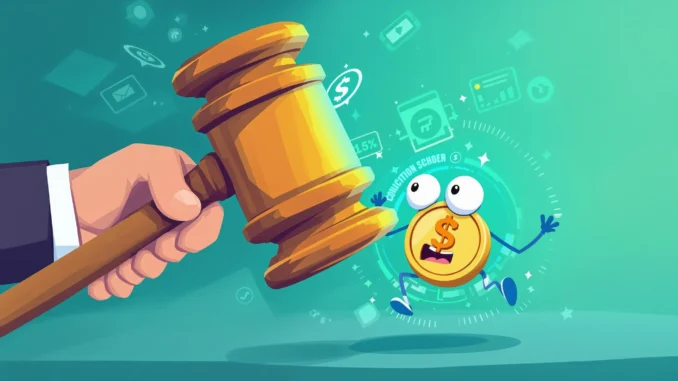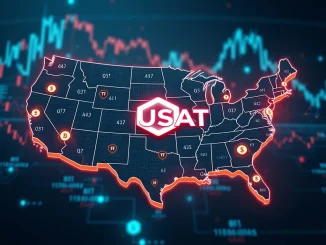
Are you tired of hearing about the latest crypto scam? Especially those flashy memecoins that promise the moon but often deliver a crash landing? Well, you’re not alone. Nic Puckrin, the CEO and co-founder of Coin Bureau, a leading voice in crypto education, is pointing fingers, and he’s not blaming the usual suspects. According to a recent report by Cointelegraph, Puckrin is laying the blame squarely at the feet of regulatory authorities for the surge in memecoin pump-and-dump schemes, like the recent LIBRA fiasco. He argues that these watchdogs are the only ones who can truly stop these scams in their tracks. Let’s dive into why he thinks so and what this means for the future of crypto investments.
Why Coin Bureau CEO is Calling for Stricter Crypto Regulation
Puckrin’s stance is clear: the current lack of robust crypto regulation is creating a breeding ground for scams. He isn’t just throwing stones; he’s highlighting a critical gap in the market’s infrastructure. He argues that the absence of clear rules and enforcement allows bad actors to thrive, preying on unsuspecting investors eager to jump on the next ‘big thing’.
Here’s a breakdown of Puckrin’s key arguments:
- The ‘Unregulated Wild West’: Puckrin uses this strong imagery to describe the current memecoin market. It’s a space where anything goes, and investor protection is often an afterthought.
- SEC’s Lack of Oversight: He specifically calls out the U.S. Securities and Exchange Commission (SEC) for not doing enough to police this area. According to Puckrin, their inaction is a significant part of the problem.
- Need for Stronger Agencies: He believes agencies like the U.S. Department of Justice (DOJ) or the U.S. Commodity Futures Trading Commission (CFTC) need to step up and take decisive action. These agencies have the power to prosecute fraud and market manipulation, which is exactly what’s needed to deter scammers.
- Industry Self-Policing is Not Enough: While acknowledging the importance of self-regulation within the crypto industry, Puckrin emphasizes that it’s not a complete solution. External, authoritative enforcement is crucial.
The LIBRA Memecoin Scam: A Case Study in the Failure of Crypto Regulation
The LIBRA memecoin incident serves as a stark example of what happens when crypto regulation is weak or non-existent. These scams typically follow a predictable pattern:
- Hype Generation: A new memecoin is launched, often with a catchy name and promises of quick riches. Social media and online communities are flooded with promotional content.
- Pump Phase: Early investors and influencers create artificial demand, driving the price up rapidly. This is the ‘pump’.
- Dump Phase: The creators and early insiders sell off their holdings at the inflated price, leaving later investors with massive losses as the price crashes. This is the ‘dump’.
In the case of LIBRA, many investors were burned, highlighting the devastating impact of these memecoin scams. Puckrin uses this example to underscore his point: without proper regulatory frameworks, these incidents will continue to plague the crypto space, eroding trust and deterring legitimate investment.
Why SEC Oversight is Crucial for Memecoin Markets
Why does Puckrin specifically mention SEC oversight? The SEC’s mandate is to protect investors, maintain fair, orderly, and efficient markets, and facilitate capital formation. In the context of memecoins, this translates to several key areas:
- Defining Securities: One of the SEC’s challenges is determining which cryptocurrencies should be classified as securities. If memecoins are deemed securities, they would fall under stricter regulatory requirements, including registration and disclosure.
- Enforcement Actions: The SEC has the power to investigate and prosecute fraudulent schemes. Stronger enforcement against memecoin scams would send a clear message to would-be scammers and provide recourse for victims.
- Investor Education: Beyond enforcement, the SEC also plays a role in educating investors about the risks involved in different types of investments. Increased awareness about memecoin scams can help investors make more informed decisions.
However, the SEC’s approach to crypto regulation has been criticized as slow and unclear, contributing to the regulatory uncertainty that Puckrin highlights.
Beyond the SEC: The Role of DOJ and CFTC in Crypto Regulation
Puckrin’s call for the DOJ and CFTC to step in broadens the scope of potential regulatory solutions. These agencies bring different strengths to the table:
- Department of Justice (DOJ): The DOJ can bring criminal charges against individuals and entities involved in crypto fraud. Criminal prosecution can be a powerful deterrent and can lead to significant penalties for wrongdoers.
- Commodity Futures Trading Commission (CFTC): The CFTC regulates commodity derivatives markets, and has asserted jurisdiction over certain cryptocurrencies as commodities. They can pursue civil enforcement actions against fraud and manipulation in these markets.
By involving multiple agencies, Puckrin suggests a multi-pronged approach to crypto regulation, recognizing that no single entity can solve the problem alone. This collaborative effort could create a more comprehensive and effective regulatory framework.
The Crypto Industry’s Responsibility: Self-Policing Against Memecoin Scams
While Puckrin emphasizes the role of regulators, he also acknowledges the crypto industry’s own responsibility to combat memecoin scams. Self-policing can take many forms:
- Exchange Vigilance: Cryptocurrency exchanges can play a crucial role by carefully vetting the memecoins they list and delisting those that show signs of manipulation or fraud.
- Community Education: Crypto communities and educational platforms like Coin Bureau can proactively educate investors about the risks of memecoin scams and how to identify red flags.
- Project Transparency: Legitimate crypto projects should prioritize transparency and open communication to build trust and differentiate themselves from scam projects.
However, self-policing alone is insufficient. As Puckrin points out, it needs to be coupled with strong external regulation to truly tackle the problem of memecoin scams.
The Benefits of Effective Crypto Regulation
While some in the crypto space resist regulation, effective crypto regulation actually offers numerous benefits:
- Investor Protection: This is the most obvious benefit. Regulation can protect investors from fraud, manipulation, and scams, ensuring a fairer and safer market.
- Market Stability: Clear rules and enforcement can reduce market volatility and create a more stable environment, attracting institutional investors and fostering long-term growth.
- Increased Trust: Regulation can build trust in the crypto market, both among investors and the general public, leading to wider adoption.
- Legitimacy: Regulation helps legitimize the crypto industry, moving it away from the perception of a lawless, risky space and towards a more mature and regulated market.
Ultimately, crypto regulation is not about stifling innovation but about creating a sustainable and trustworthy ecosystem.
Challenges in Regulating Memecoin Scams
Regulating memecoin scams is not without its challenges:
- Decentralization: The decentralized nature of many cryptocurrencies makes it difficult to pinpoint responsible parties and enforce regulations.
- Speed of Innovation: The crypto space moves incredibly fast, and regulations often struggle to keep pace with new trends and technologies.
- Global Nature: Crypto is a global phenomenon, and regulations in one jurisdiction may be circumvented by operating in another. International cooperation is essential.
- Defining Memecoins: Creating a clear definition of what constitutes a memecoin for regulatory purposes can be complex.
Despite these challenges, Puckrin’s message is clear: the risks of inaction far outweigh the difficulties of implementing effective crypto regulation.
Actionable Insights: How to Protect Yourself from Memecoin Scams
While we wait for stronger crypto regulation, what can you do to protect yourself from memecoin scams?
- Do Your Research: Before investing in any memecoin, thoroughly research the project, its team, and its community. Be wary of projects that lack transparency or have anonymous founders.
- Be Skeptical of Hype: Memecoin scams thrive on hype. Be cautious of coins that are heavily promoted on social media with unrealistic promises of quick gains.
- Look for Utility: Ask yourself if the memecoin has any real-world utility or if it’s purely based on hype and speculation.
- Start Small: If you decide to invest in a memecoin, only invest a small amount that you can afford to lose.
- Diversify Your Portfolio: Don’t put all your eggs in one basket, especially not a memecoin basket. Diversify your crypto portfolio with more established and reputable cryptocurrencies.
Conclusion: A Wake-Up Call for Crypto Regulation
Nic Puckrin’s statements serve as a urgent warning and a wake-up call for regulators and the crypto industry alike. The rise of memecoin scams like LIBRA highlights a critical need for stronger crypto regulation and SEC oversight, along with the involvement of agencies like the DOJ and CFTC. While self-policing within the industry is important, it’s not a substitute for robust external enforcement. Protecting investors, ensuring market stability, and fostering trust in the crypto space requires a concerted effort from all stakeholders. The time for action is now, before more investors fall victim to these preventable scams.



